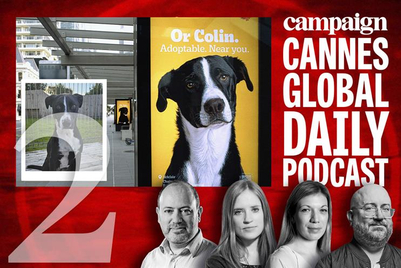
In Dentsu Tokyo’s work for Radio Fukushima, a daytime earthquake evacuation drill was redesigned into a radio piece. During the programme, listeners tuned in on their radio in the darkness and experienced evacuating from their beds to their front doors. This was to help residents with night-time evacuation drills, given that earthquakes don't limit themselves to daylight hours.
This campaign was the only Asian work shortlisted in Cannes Lions’ Radio & Audio category this year. Australia bagged five shortlists, wrapping up APAC presence in this category. (See the Radio & Audio Lions shortlist here; the winners will be revealed this evening.)
“APAC was hardest hit by the pandemic,” Merlee Jayme, president of the 2021 Cannes Lions’ Radio & Audio Jury, told Campaign Asia-Pacific. “Yet, we still saw brilliant work coming through. I'm not sure if this is worse than that of previous years but I'm positive the deserving work will win big.”
| See all our Cannes Lions 2021 coverage |
Jayme said what the judges truly noticed this year was that more brands have become purposeful, and they were making sure that campaigns are increasingly relevant to people's lives especially during these trying times. Jayme is global president at Dentsu Mcgarrybowen and chairmom at Dentsu JaymeSyfu.
Overall, the radio and audio entries were uniquely balanced. We judged two years of worth of work—both Covid-affected and otherwise. Early on, we listed down what we wanted to look out for in our shortlist. We said human connection and the influence on people's lives were something we were looking for.
Other criteria for winning work were seriously beautiful writing, amazing production, craft and performance, amazing use of technology, the brand relevance, strategy and pushing the power of audio beyond radio. If you look at our metals, these were all kinds of work that simply made each one of us jealous.
In terms of key themes this year, Jayme said entries leaned towards recreating and recording sounds to remind us of what we missed pre-pandemic. For instance, there were sounds of New York streets, parks, a supermarket or even pieces of Lego being thrown on the floor. Ambient sounds were recreated, amplified with 3D, AR sounds or binaural beats, and blended into music.
On top of that, there was a trend of anthems and jingles being rewritten with meaningful lyrics and recording them differently for a purpose. “What separated one from the other was the power of context or its brand relevance,” said Jayme.
There was also a higher degree of experiential innovations in sound. Jayme said there were ideas using frequencies from measuring taste, to helping mental, physical and environmental wellbeing. Sound was used to make plants grow, comfort kids with cystic fibrosis and even make the blind ‘watch’ a tennis game.
It was the best jury for me, ever. How I would have loved all of us to be in a real room. Must have been incredibly fun with non-stop discussions. Everyone felt comfortable speaking up—which for me was very important. We had a category master, a researcher, a cultural analyst, a sound production and tech expert all in one Zoom call.
Even during online judging, we were connecting through WhatsApp just in case we had questions or clarifications about some cultural insights or translations. We were mostly unanimous in choosing our metals. The long, hard discussion was the Grand Prix. I loved [the team of judges] so much that I gifted them with a Spotify playlist called ‘Eargasm’ to relax their ears after listening to all 890 entries.


.jpg&h=334&w=500&q=100&v=20250320&c=1)


.png&h=334&w=500&q=100&v=20250320&c=1)



.png&h=334&w=500&q=100&v=20250320&c=1)

.png&h=334&w=500&q=100&v=20250320&c=1)

.jpg&h=268&w=401&q=100&v=20250320&c=1)
.jpeg&h=268&w=401&q=100&v=20250320&c=1)



.png&h=268&w=401&q=100&v=20250320&c=1)
